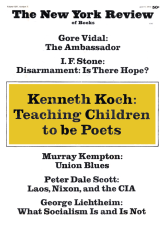In response to:
If Plato Only Knew from the November 6, 1969 issue
To the Editors:
Gilbert Ryle, as was to be expected, has written a frivolous review of my translation and interpretation of Plato’s Republic [NYR, November 6], although he has done me the honor of casting me from the ranks of the philosophic in the company of so distinguished a Platonic scholar as Paul Friedländer. Ryle makes no attempt to summarize our arguments or to elaborate an immanent criticism of them. Instead, we are drowned in a torrent of “toshes,” “Oh dears,” and “heavens.” In Ryle’s school that apparently constitutes a refutation.
In themselves Ryle’s opinions are beneath consideration, but they do deserve diagnosis as a symptom of a sickness which is corrupting our understanding of old writers and depriving a generation of their liberating influence.
According to Ryle, the serious interpreters of Plato do him “justice” by “Aristotelianizing” him. This means that Ryle and his friends abstract from the form of the dialogue and from Plato’s own questions. They put the Republic through an analytic strainer which leaves them a few essences, mostly out of Books 6 and 7; the rest is rejected as untheoretical, poetic, dross. But Ryle is unable to give a rational account of why we should use that strainer. His method is not the natural beginning point, and it is surely contrary to Plato’s way of treating questions. Ryle, in his unphilosophic, nay, dogmatic, self-satisfaction, supposes he does Plato a favor by torturing Plato into thinking like Ryle.
In keeping with his assurance that his concerns are the only ones proper to the man who desires to know, Ryle diagnoses as sub-philosophic the political concerns with which he takes me to be preoccupied. But it is not I who invented Socrates, the founder of political philosophy, whose revolution in philosophy consisted in turning away from the divine to the human things. When one thinks about it for a moment, one becomes aware of just how outrageous it is for an interpreter of the Republic to be ridiculed for talking about politics. The explicit theme of the Republic is justice, and it teaches that philosophy is the culmination of the passion for justice. This is surely incomprehensible to Ryle, but that is his problem, not Plato’s or mine.
I shall give two examples, drawn from the review, of the consequences of Ryle’s prejudices.
a) He gives short shrift to the most important part of my book, the translation. In the context of a few casually disparaging remarks, he asserts that ideas (in italics) is no improvement on “Forms.” Of course it isn’t, nor was it intended to be. In Greek there are two words, eidos and idea, with the same root, which in most translations are rendered indifferently by “form.” But there is an important nuance of difference between the two. I thought it desirable for the reader to know of this distinction and to be able to interpret its significance himself. For the relatively infrequent use of idea, I decided merely to transliterate the Greek and reserved “form” for eidos. There is a note to that effect. But Ryle did not see my note nor was he aware that I did regularly use “form.” Otherwise he would not have made his remark, or he would at least have had to argue that the distinction is not worth making. He read me as sloppily as he reads Plato; texts are for him quarries from which he mines raw materials for his word games. What Plato really says is of no concern to him, and thus he can assert that all of the translations—including Cornford’s, which cuts out large portions of Plato’s text—are equally good for “philosophical” purposes.
The usual criticism of men of Ryle’s persuasion is that they are dry and unable to deal with important problems. Although this is largely an accurate description, the decisive objection to them is that they lack that very precision on which they pride themselves. They do so because they lack a sufficient motive for care: they do not hope to find the truth in the books they read.
b) Ryle says that I “pep up” the Republic by speaking of Glaucon’s erotic nature. He exposes the impropriety of my concern by pointing out that there is little explicit description of Glaucon. Apparently Ryle believes that Plato must be like those medieval painters who, fearing that the meanest of intellects would not be able to recognize their intention, affixed banners to their figures, identifying them as “Faith,” “Charity,” “Sin,” etc. Ryle surveys the splendid spectacle of the Platonic dialogues with a sightless eye. He is so busy uncovering things he himself buried in the text that the obvious difference between the natures of Glaucon and Adeimantus—and hence the Republic’s teaching about the soul—escapes him. Although Ryle professes great interest in Plato’s understanding of the soul, he pays no attention to eros, which is undeniably for Plato one of the most important constituents of the soul. But, for Ryle, eros is another one of those sub-philosophic things like politics which mature professors at Oxford learn to get over.
Such scholarship should give us pause, for Ryle is held by many to be one of the preeminent professors of philosophy in the Anglo-Saxon world.
Allan Bloom
Tel Aviv
This Issue
April 9, 1970



